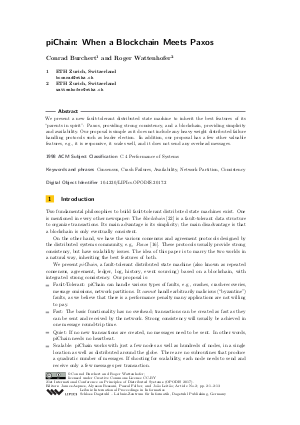piChain: When a Blockchain meets Paxos
Authors Conrad Burchert, Roger Wattenhofer
-
Part of:
Volume:
21st International Conference on Principles of Distributed Systems (OPODIS 2017)
Part of: Series: Leibniz International Proceedings in Informatics (LIPIcs)
Part of: Conference: International Conference on Principles of Distributed Systems (OPODIS) - License:
 Creative Commons Attribution 3.0 Unported license
Creative Commons Attribution 3.0 Unported license
- Publication Date: 2018-03-28
File

PDF
LIPIcs.OPODIS.2017.2.pdf
- Filesize: 0.5 MB
- 13 pages
Document Identifiers
Subject Classification
Keywords
- Consensus
- Crash Failures
- Availability
- Network Partition
- Consistency
Metrics
- Access Statistics
-
Total Accesses (updated on a weekly basis)
0PDF Downloads0Metadata Views
Abstract
We present a new fault-tolerant distributed state machine to inherit the best features of its “parents in spirit”: Paxos, providing strong consistency, and a blockchain, providing simplicity and availability. Our proposal is simple as it does not include any heavy weight distributed failure handling protocols such as leader election. In addition, our proposal has a few other valuable features, e.g., it is responsive, it scales well, and it does not send any overhead messages.
Cite As Get BibTex
Conrad Burchert and Roger Wattenhofer. piChain: When a Blockchain meets Paxos. In 21st International Conference on Principles of Distributed Systems (OPODIS 2017). Leibniz International Proceedings in Informatics (LIPIcs), Volume 95, pp. 2:1-2:13, Schloss Dagstuhl – Leibniz-Zentrum für Informatik (2018)
https://doi.org/10.4230/LIPIcs.OPODIS.2017.2
BibTex
@InProceedings{burchert_et_al:LIPIcs.OPODIS.2017.2,
author = {Burchert, Conrad and Wattenhofer, Roger},
title = {{piChain: When a Blockchain meets Paxos}},
booktitle = {21st International Conference on Principles of Distributed Systems (OPODIS 2017)},
pages = {2:1--2:13},
series = {Leibniz International Proceedings in Informatics (LIPIcs)},
ISBN = {978-3-95977-061-3},
ISSN = {1868-8969},
year = {2018},
volume = {95},
editor = {Aspnes, James and Bessani, Alysson and Felber, Pascal and Leit\~{a}o, Jo\~{a}o},
publisher = {Schloss Dagstuhl -- Leibniz-Zentrum f{\"u}r Informatik},
address = {Dagstuhl, Germany},
URL = {https://drops.dagstuhl.de/entities/document/10.4230/LIPIcs.OPODIS.2017.2},
URN = {urn:nbn:de:0030-drops-86543},
doi = {10.4230/LIPIcs.OPODIS.2017.2},
annote = {Keywords: Consensus, Crash Failures, Availability, Network Partition, Consistency}
}
Author Details
References
-
Atul Adya, William J Bolosky, Miguel Castro, Gerald Cermak, Ronnie Chaiken, John R Douceur, Jon Howell, Jacob R Lorch, Marvin Theimer, and Roger P Wattenhofer. Farsite: Federated, available, and reliable storage for an incompletely trusted environment. ACM SIGOPS Operating Systems Review (OSR), 2002.

-
Mahesh Balakrishnan, Dahlia Malkhi, Vijayan Prabhakaran, Ted Wobbler, Michael Wei, and John D. Davis. CORFU: A shared log design for flash clusters. In Symposium on Networked Systems Design and Implementation (NSDI 12), 2012.

-
Eric A Brewer. Towards robust distributed systems. In ACM Symposium on Principles of Distributed Computing (PODC), 2000.

-
Mike Burrows. The chubby lock service for loosely-coupled distributed systems. In Symposium on Operating systems design and implementation (OSDI), 2006.

-
Miguel Castro, Barbara Liskov, et al. Practical byzantine fault tolerance. In USENIX Symposium on Operating Systems Design and Implementation (OSDI), 1999.

-
Tushar D Chandra, Robert Griesemer, and Joshua Redstone. Paxos made live: an engineering perspective. In ACM Symposium on Principles of Distributed Computing (PODC), 2007.

-
James C. Corbett, Jeffrey Dean, Michael Epstein, Andrew Fikes, Christopher Frost, JJ Furman, Sanjay Ghemawat, Andrey Gubarev, Christopher Heiser, Peter Hochschild, Wilson Hsieh, Sebastian Kanthak, Eugene Kogan, Hongyi Li, Alexander Lloyd, Sergey Melnik, David Mwaura, David Nagle, Sean Quinlan, Rajesh Rao, Lindsay Rolig, Yasushi Saito, Michal Szymaniak, Christopher Taylor, Ruth Wang, and Dale Woodford. Spanner: Google’s globally-distributed database, 2012.

-
Kyle Croman, Christian Decker, Ittay Eyal, Adem Efe Gencer, Ari Juels, Ahmed Kosba, Andrew Miller, Prateek Saxena, Elaine Shi, Emin Gun Sirer, Dawn Song, and Roger Wattenhofer. On scaling decentralized blockchains. In 3rd Workshop on Bitcoin Research (BITCOIN), 2016.

-
Christian Decker, Jochen Seidel, and Roger Wattenhofer. Bitcoin meets strong consistency. In International Conference on Distributed Computing and Networking (ICDCN), 2016.

-
Christian Decker and Roger Wattenhofer. Information Propagation in the Bitcoin Network. In 13th IEEE International Conference on Peer-to-Peer Computing (P2P), Trento, Italy, September 2013.

-
Evan Duffield and Daniel Diaz. Dash: A privacy-centric crypto-currency, 2014.

-
Leslie Lamport et al. Paxos made simple. ACM Sigact News, 32(4):18-25, 2001.

-
Arthur Gervais, Ghassan O. Karame, Karl Wüst, Vasileios Glykantzis, Hubert Ritzdorf, and Srdjan Capkun. On the security and performance of proof of work blockchains. In ACM Conference on Computer and Communications Security (CCS), 2016.

-
Patrick Hunt, Mahadev Konar, Flavio Paiva Junqueira, and Benjamin Reed. Zookeeper: Wait-free coordination for internet-scale systems. In USENIX annual technical conference (USENIX ATC), 2010.

-
Ramakrishna Kotla, Lorenzo Alvisi, Mike Dahlin, Allen Clement, and Edmund Wong. Zyzzyva: speculative byzantine fault tolerance. In ACM SIGOPS Operating Systems Review (OSR), 2007.

-
Leslie Lamport. The part-time parliament. ACM Transactions on Computer Systems (TOCS), 16(2):133-169, 1998.

-
Leslie Lamport. Fast paxos. Distributed Computing, 19(2):79-103, 2006.

-
Leslie Lamport. Byzantizing paxos by refinement. In International Symposium on Distributed Computing (DISC), 2011.

-
Leslie Lamport and Mike Massa. Cheap paxos. In International Conference on Dependable Systems and Networks (DSN), 2004.

-
Leslie Lamport, Robert Shostak, and Marshall Pease. The byzantine generals problem. ACM Transactions on Programming Languages and Systems (TOPLAS), 1982.

-
Iulian Moraru, David G Andersen, and Michael Kaminsky. Paxos quorum leases: Fast reads without sacrificing writes. In ACM Symposium on Cloud Computing, 2014.

-
Satoshi Nakamoto. Bitcoin: A peer-to-peer electronic cash system, 2008.

-
Diego Ongaro and John Ousterhout. In search of an understandable consensus algorithm. In USENIX Annual Technical Conference (USENIX ATC), 2014.

-
Marshall Pease, Robert Shostak, and Leslie Lamport. Reaching agreement in the presence of faults. Journal of the ACM (JACM), 1980.

-
Jun Rao, Eugene J Shekita, and Sandeep Tata. Using paxos to build a scalable, consistent, and highly available datastore. In International Conference on Very Large Data Bases (VLDB), 2011.

-
Dale Skeen and Michael Stonebraker. A formal model of crash recovery in a distributed system. IEEE Transactions on Software Engineering, SE-9(3):219-228, 1983.

